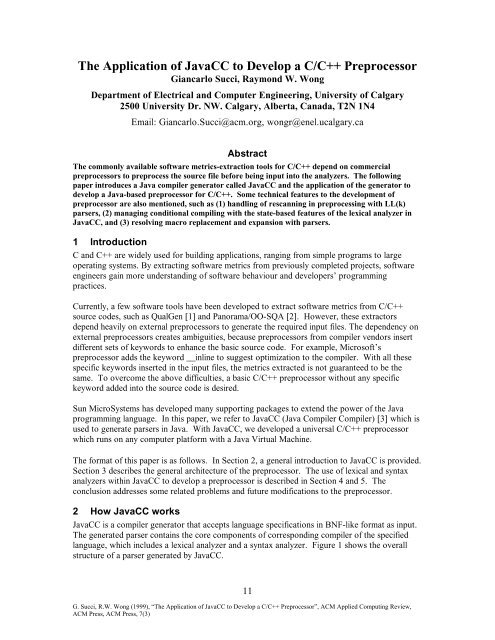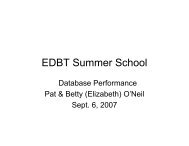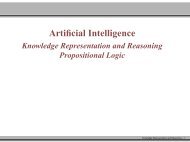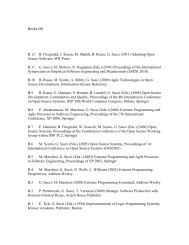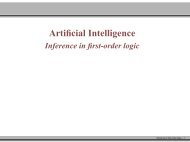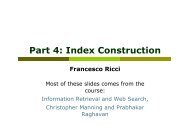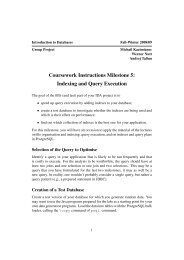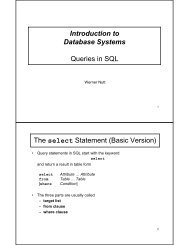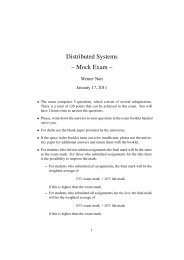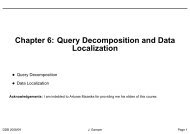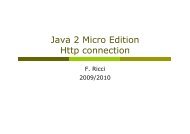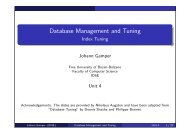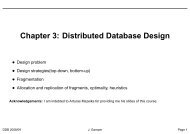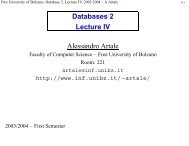The Application of JavaCC to Develop a C/C++ Preprocessor
The Application of JavaCC to Develop a C/C++ Preprocessor
The Application of JavaCC to Develop a C/C++ Preprocessor
Create successful ePaper yourself
Turn your PDF publications into a flip-book with our unique Google optimized e-Paper software.
<strong>The</strong> <strong>Application</strong> <strong>of</strong> <strong>JavaCC</strong> <strong>to</strong> <strong>Develop</strong> a C/<strong>C++</strong> <strong>Preprocessor</strong><br />
Giancarlo Succi, Raymond W. Wong<br />
Department <strong>of</strong> Electrical and Computer Engineering, University <strong>of</strong> Calgary<br />
2500 University Dr. NW. Calgary, Alberta, Canada, T2N 1N4<br />
Email: Giancarlo.Succi@acm.org, wongr@enel.ucalgary.ca<br />
Abstract<br />
<strong>The</strong> commonly available s<strong>of</strong>tware metrics-extraction <strong>to</strong>ols for C/<strong>C++</strong> depend on commercial<br />
preprocessors <strong>to</strong> preprocess the source file before being input in<strong>to</strong> the analyzers. <strong>The</strong> following<br />
paper introduces a Java compiler genera<strong>to</strong>r called <strong>JavaCC</strong> and the application <strong>of</strong> the genera<strong>to</strong>r <strong>to</strong><br />
develop a Java-based preprocessor for C/<strong>C++</strong>. Some technical features <strong>to</strong> the development <strong>of</strong><br />
preprocessor are also mentioned, such as (1) handling <strong>of</strong> rescanning in preprocessing with LL(k)<br />
parsers, (2) managing conditional compiling with the state-based features <strong>of</strong> the lexical analyzer in<br />
<strong>JavaCC</strong>, and (3) resolving macro replacement and expansion with parsers.<br />
1 Introduction<br />
C and <strong>C++</strong> are widely used for building applications, ranging from simple programs <strong>to</strong> large<br />
operating systems. By extracting s<strong>of</strong>tware metrics from previously completed projects, s<strong>of</strong>tware<br />
engineers gain more understanding <strong>of</strong> s<strong>of</strong>tware behaviour and developers’ programming<br />
practices.<br />
Currently, a few s<strong>of</strong>tware <strong>to</strong>ols have been developed <strong>to</strong> extract s<strong>of</strong>tware metrics from C/<strong>C++</strong><br />
source codes, such as QualGen [1] and Panorama/OO-SQA [2]. However, these extrac<strong>to</strong>rs<br />
depend heavily on external preprocessors <strong>to</strong> generate the required input files. <strong>The</strong> dependency on<br />
external preprocessors creates ambiguities, because preprocessors from compiler vendors insert<br />
different sets <strong>of</strong> keywords <strong>to</strong> enhance the basic source code. For example, Micros<strong>of</strong>t’s<br />
preprocessor adds the keyword __inline <strong>to</strong> suggest optimization <strong>to</strong> the compiler. With all these<br />
specific keywords inserted in the input files, the metrics extracted is not guaranteed <strong>to</strong> be the<br />
same. To overcome the above difficulties, a basic C/<strong>C++</strong> preprocessor without any specific<br />
keyword added in<strong>to</strong> the source code is desired.<br />
Sun MicroSystems has developed many supporting packages <strong>to</strong> extend the power <strong>of</strong> the Java<br />
programming language. In this paper, we refer <strong>to</strong> <strong>JavaCC</strong> (Java Compiler Compiler) [3] which is<br />
used <strong>to</strong> generate parsers in Java. With <strong>JavaCC</strong>, we developed a universal C/<strong>C++</strong> preprocessor<br />
which runs on any computer platform with a Java Virtual Machine.<br />
<strong>The</strong> format <strong>of</strong> this paper is as follows. In Section 2, a general introduction <strong>to</strong> <strong>JavaCC</strong> is provided.<br />
Section 3 describes the general architecture <strong>of</strong> the preprocessor. <strong>The</strong> use <strong>of</strong> lexical and syntax<br />
analyzers within <strong>JavaCC</strong> <strong>to</strong> develop a preprocessor is described in Section 4 and 5. <strong>The</strong><br />
conclusion addresses some related problems and future modifications <strong>to</strong> the preprocessor.<br />
2 How <strong>JavaCC</strong> works<br />
<strong>JavaCC</strong> is a compiler genera<strong>to</strong>r that accepts language specifications in BNF-like format as input.<br />
<strong>The</strong> generated parser contains the core components <strong>of</strong> corresponding compiler <strong>of</strong> the specified<br />
language, which includes a lexical analyzer and a syntax analyzer. Figure 1 shows the overall<br />
structure <strong>of</strong> a parser generated by <strong>JavaCC</strong>.<br />
11
Lexical<br />
Analyzer<br />
MyParserTokens.java<br />
MyParserConstants.java<br />
TokenManagerError.java<br />
<strong>JavaCC</strong> Source<br />
e.g. MyParser.jj<br />
<strong>JavaCC</strong><br />
Compiler<br />
Syntax<br />
Analyzer<br />
MyParser.java<br />
ParseException.java<br />
Figure 1. Generation <strong>of</strong> <strong>JavaCC</strong> Parser<br />
2.1 Lexical Analysis with <strong>JavaCC</strong><br />
<strong>The</strong> lexical analyzer in <strong>JavaCC</strong> is called “TokenManager”. <strong>The</strong> TokenManager is used <strong>to</strong> group<br />
characters from an input stream in<strong>to</strong> Tokens according <strong>to</strong> specific rules. Each specified rule in<br />
TokenManager is associated with an expression kind [4]:<br />
SKIP: Throw away the matched expression<br />
MORE: Continue taking the next matched expression <strong>to</strong> build up a longer expression<br />
TOKEN: Creates a <strong>to</strong>ken using the matched expression and send it <strong>to</strong> the syntax analyzer<br />
SPECIAL_TOKEN: Creates a <strong>to</strong>ken with the match expression and optionally send <strong>to</strong> the syntax<br />
analyzer, which is different from TOKEN.<br />
<strong>The</strong> TokenManager is a state machine that moves between different lexical states <strong>to</strong> classify<br />
<strong>to</strong>kens. Figure 2 illustrates a sample state machine feature <strong>of</strong> the lexical analyzer. When the<br />
analyzer starts, it is in the Default State which waits for inputs. If the input is a character "A",<br />
it moves <strong>to</strong> State A. <strong>The</strong>n from State A, if the input is character "A", it stays in the same state.<br />
However, when the input is character "B" or "C", the system moves <strong>to</strong> the corresponding states.<br />
If the state machine is facing an unspecified situation, such as hitting a character "E" in State C,<br />
it generates lexical errors. <strong>The</strong> following code segment implements a portion <strong>of</strong> the<br />
TokenManager for the described lexical analyzer in <strong>JavaCC</strong>:<br />
SPECIAL_TOKEN {<br />
: State_A //Switch <strong>to</strong> State A if input character is “A”<br />
}<br />
SPECIAL_TOKEN : {<br />
//Stay in State A if input character is “A”<br />
| : State_B //Switch <strong>to</strong> State B if input character is “B”<br />
}<br />
SPECIAL_TOKEN : {<br />
: State_C //Switch <strong>to</strong> State C if input character is “C”<br />
| : Default //Switch <strong>to</strong> DEFAULT state if input character is “D”<br />
}<br />
SPECIAL_TOKEN : {<br />
//Stay in State C if input character is “C”<br />
| : Default //Switch <strong>to</strong> DEFAULT state if input character is “D”<br />
}<br />
12
"A"<br />
State A<br />
"B"<br />
"A"<br />
Default<br />
"D"<br />
"C"<br />
"C"<br />
State B<br />
"D"<br />
Token Manager<br />
State C<br />
Figure 2. State Machine Features in Lexical Analyzer<br />
2.2 Syntax Analysis with <strong>JavaCC</strong><br />
<strong>The</strong> syntax analyzer in <strong>JavaCC</strong> is a recursive-descent LL(k) parser. This type <strong>of</strong> parser uses k<br />
number <strong>of</strong> lookahead <strong>to</strong>kens <strong>to</strong> generate a set <strong>of</strong> mutually exclusive productions, which recognize<br />
the language being parsed by the parser. By default, <strong>JavaCC</strong>’s syntax analyzer sets k <strong>to</strong> 1, but<br />
developers can override the number <strong>of</strong> lookahead <strong>to</strong>kens <strong>to</strong> any arbitrary number <strong>to</strong> match<br />
productions correctly.<br />
LL(k) parsers allow only right recursion in the production [5]. Consider a commonly used syntax<br />
for Expression in C/<strong>C++</strong> that call itself recursively:<br />
Expression::= Expression opera<strong>to</strong>rs Expression<br />
|"(" Expression ")"<br />
|<br />
<strong>The</strong> left recursive production is not allowed in LL parsers, the syntax must be reconstructed so<br />
that the parser can recognize the production correctly with limited amount <strong>of</strong> lookahead <strong>to</strong>kens.<br />
<strong>The</strong>refore, sequences <strong>of</strong> <strong>to</strong>kens that generate mutually exclusive situations in the production<br />
should be placed in the beginning <strong>of</strong> each possible case. In the example <strong>of</strong> Expression<br />
production, we uses the character "(" and the <strong>to</strong>ken <strong>to</strong> separate the production in<strong>to</strong><br />
two mutually exclusive situations. In this way, the Expression production is structured as shown:<br />
Expression::= (opera<strong>to</strong>r Expression)+<br />
|"(" Expression ")"<br />
This approach always requires in any LL(k) parsers and it is <strong>of</strong>ten no trivial <strong>to</strong> implement the<br />
requiring changes in the structure <strong>of</strong> the grammar from the targeted language’s BNF<br />
specification. <strong>The</strong>refore the conversion <strong>of</strong> the syntax in<strong>to</strong> right recursion should be considered<br />
with cares.<br />
3 General Architecture <strong>of</strong> C/<strong>C++</strong> <strong>Preprocessor</strong><br />
<strong>The</strong> directives defined in the preprocessor in C/<strong>C++</strong> specify actions for (1) macro substitution, (2)<br />
conditional compilation and (3) source files inclusion [6]. <strong>The</strong> <strong>to</strong>ken manager and syntax<br />
analyzer in the preprocessing language shares different responsibilities. <strong>The</strong> <strong>to</strong>ken manager first<br />
identifies preprocessing directives and segments the required blocks <strong>of</strong> code for preprocessing.<br />
<strong>The</strong>n the syntax analyzer processes the code by applying the specified directives.<br />
<strong>The</strong> major problem faced in the preprocessing is rescanning. Consider the following example:<br />
#define hello<br />
helloWorld<br />
13
#define helloWorld MyExample<br />
Rescanning is a recursive step in preprocessing because the process continues until all defined<br />
macros are replaced. According <strong>to</strong> the example, a call <strong>to</strong> hello first generates hellowWorld as an<br />
intermediate result. <strong>The</strong>n the result is rescanned and replaced <strong>to</strong> MyExample. Because there are<br />
no further definition <strong>of</strong> MyExample is found, the rescanning process terminates.<br />
<strong>The</strong> rescanning process is done by invoking the preprocessor recursivly. <strong>The</strong> code segment that<br />
requires rescan is input in<strong>to</strong> another instance <strong>of</strong> the preprocessor. After processing the segment,<br />
the preprocessed result is returned in<strong>to</strong> <strong>to</strong> the main preprocessor for further operations. <strong>The</strong><br />
rescanning process is a supporting operation in preprocessing.<br />
<strong>The</strong> differentiation <strong>of</strong> main and support processes separates the preprocessor in<strong>to</strong> different<br />
functionality. <strong>The</strong> functionality <strong>of</strong> the main preprocessor parser is responsibility for managing<br />
the overall operations, including file inclusion and rescanning. It remembers the information <strong>of</strong><br />
the preprocessing, so that it resumes or advances <strong>to</strong> the correct position after invoking other<br />
supporting processes. <strong>The</strong> preprocessor dispatches other operations <strong>to</strong> three supporting parsers.<br />
1. <strong>The</strong> conditional expression replacer <strong>to</strong> replace macros expressed in a conditional statement<br />
2. <strong>The</strong> conditional expression evalua<strong>to</strong>r <strong>to</strong> evaluate conditional expressions<br />
3. <strong>The</strong> macro expander <strong>to</strong> handle macro expansion<br />
Table 1 lists the detail responsibilities <strong>of</strong> the various parsers used for preprocessing.<br />
Name <strong>of</strong> Component<br />
Functionality<br />
File Inclusion<br />
• Locates and loads files from s<strong>to</strong>rage<br />
Handle define directive definition<br />
• Reads in simple and function-like Macro definitions<br />
Segment Preprocessing Blocks<br />
• Calls conditional expression replacer and conditional<br />
Main <strong>Preprocessor</strong> Parser expression evalua<strong>to</strong>r <strong>to</strong> evaluate which conditional compilation<br />
block should be included in the preprocessing<br />
• Calls macro expander for complex macro expansions<br />
Perform “Standard” Preprocessing<br />
• Handles string concatenation<br />
• Handles simple macro replacement<br />
• Performs rescanning<br />
• Generates preprocessed file<br />
Replace arguments in the conditional statements defined by<br />
Conditional Expression Replacer<br />
macros<br />
Conditional Expression Evalua<strong>to</strong>r Evaluate <strong>of</strong> condition statements<br />
Handle Macro Expansion<br />
Macro Expander • Expands macros with parameters<br />
• Handles # and ## opera<strong>to</strong>rs<br />
Table 1. <strong>The</strong> Core Components <strong>of</strong> the C/<strong>C++</strong> <strong>Preprocessor</strong><br />
4 Other Issues Faced in Token Manager<br />
<strong>The</strong> Token Manager in the <strong>Preprocessor</strong> directly reads in the characters from input streams and<br />
recognizes <strong>to</strong>kens needed by the parser. <strong>The</strong> preprocessor separates the input in<strong>to</strong> two different<br />
sets <strong>of</strong> <strong>to</strong>kens: (1) Preprocessing Directives and (2) Source Body.<br />
14
<strong>The</strong> preprocessing directives are specific keywords defined by the C/<strong>C++</strong> language specification.<br />
<strong>The</strong>se directives define a set <strong>of</strong> actions <strong>to</strong> be performed by the preprocessor. <strong>The</strong>y include:<br />
• #include <strong>to</strong> include other files for preprocessing<br />
• #define <strong>to</strong> associate a macro or replacement mechanism <strong>to</strong> a specific set <strong>of</strong> identifiers<br />
• #if, #elif, #endif <strong>to</strong> establish conditional compilation units at compile-time<br />
Each directive has its own syntax <strong>to</strong> define the associated action. For example, the<br />
#include directive uses the syntax "file-name" and <strong>to</strong> differentiate the<br />
location <strong>of</strong> the include file. This situation is handled an INCLUDE_STATEMENT state in the<br />
TokenManager.<br />
SPECIAL_TOKEN {<br />
: INCLUDE_STATEMENT<br />
}<br />
<strong>The</strong> INCLUDE_STATEMENT has two different cases, for handling both local or global file inclusions.<br />
After identifying the include file name, the Token Manager changes back <strong>to</strong> the DEFAULT state <strong>to</strong><br />
match other <strong>to</strong>kens.<br />
When considering the selection <strong>of</strong> compilation units in the preprocessing, the state-machine<br />
capability <strong>of</strong> the <strong>to</strong>ken manager in <strong>JavaCC</strong> simplifies the development. A more complex example<br />
is the evaluation <strong>of</strong> conditional blocks in preprocessing. After the evaluation <strong>of</strong> the conditional<br />
stations in #if or #elif statements, the Token Manager may advance <strong>to</strong> two different states<br />
depending on the result:<br />
1. If the evaluated result is TRUE, the preprocessor should include the current statement block for<br />
preprocessing – DEFAULT State<br />
2. If the evaluated result is FALSE, the preprocessor should discard the current block and move<br />
<strong>to</strong> the next preprocessing block – IGNORE_IF State<br />
For simplicity, the following example illustrates how <strong>JavaCC</strong> is capable <strong>of</strong> handling the #if<br />
situation first by moving the state <strong>of</strong> Token Manager <strong>to</strong> IF_EXPRESSION:<br />
SPECIAL_TOKEN {<br />
: IF_EXPRESSION<br />
}<br />
In the IF_EXPRESSION state, the preprocessor identifies the conditional expression from the<br />
source file and sends the identified block in<strong>to</strong> the conditional expression replacer as the argument.<br />
After processing the input argument, the result passes in<strong>to</strong> the conditional expression evalua<strong>to</strong>r<br />
for evaluation. <strong>The</strong> evaluated result is sent back <strong>to</strong> the preprocessor and it determines the next<br />
state <strong>of</strong> the TokenManager depending on the situation.<br />
After processing the directives <strong>of</strong> preprocessing in the Token Manager, the built <strong>to</strong>kens which<br />
form the source body <strong>of</strong> the input code are passed <strong>to</strong> the syntax analyzer for string concatenation,<br />
macro replacement, and macro expansion.<br />
5 Syntax Analyzer and Preprocessing<br />
With most <strong>of</strong> the preprocessing work done by the TokenManager, the major focus <strong>of</strong> the syntax<br />
analyzer is <strong>to</strong> process all the predefined macros in #define directive by (1) replacing or (2)<br />
expanding them accordingly. Because <strong>of</strong> the need <strong>of</strong> checking each <strong>to</strong>ken in the source body for<br />
15
eplacement, the syntax analyzer reads in each non-numeric <strong>to</strong>ken and checks against the lookup<br />
table that s<strong>to</strong>res the predefined macros. <strong>The</strong> searching in the lookup table is time consuming and<br />
the large lookup table occupies a significant amount <strong>of</strong> resources in the Java Virtual Machine.<br />
<strong>The</strong> direct replacement <strong>of</strong> macro is handled in the main preprocessor. <strong>The</strong> code for such operation<br />
follows:<br />
t= // Read in a non-numerical <strong>to</strong>ken<br />
{<br />
//Check if the <strong>to</strong>ken is a predefined macro<br />
if (DefineSet.isDefined(t.image)) {<br />
DefineHandler dh = DefineSet.getDefinition(t.image);<br />
}<br />
//Check <strong>to</strong> see if the <strong>to</strong>ken is a Simple Macro<br />
if (dh.isSimpleMacro()) {<br />
//Replace the <strong>to</strong>ken with the predefined macro<br />
resultingFile.print(" "+dh.replace());<br />
}<br />
} else { //it is not a definition nor a macro<br />
resultingFile.print(" "+t.image);<br />
}<br />
<strong>The</strong> replacement algorithm checks each identifier against the lookup table. If the matched<br />
identifier requires direct replacement the macro will be replaced with the suggestion.<br />
However, the macro definition with parameters, or function-like macro definition requires a more<br />
complex algorithm for expansion. For example, given the macro definitions:<br />
#define addition(A,B)<br />
A + B<br />
<strong>The</strong> call addition(Parameter1, Parameter2) yields Parameter1 + Parameter2. <strong>The</strong><br />
problem <strong>of</strong> macro definition is further complicated by the introduction <strong>of</strong> # and ## opera<strong>to</strong>rs. <strong>The</strong><br />
# opera<strong>to</strong>r will be replaced in the expansion by a string literal corresponding <strong>to</strong> the argument,<br />
while the ## opera<strong>to</strong>r concatenates the argument and the adjacent <strong>to</strong>ken <strong>to</strong>gether. Consider the<br />
following example (for more complex cases, see [6]):<br />
#define message(m) Print(m #)<br />
#define hello(a) Hello ## a<br />
<strong>The</strong> call <strong>to</strong> message(test) and hello(World) gives the following results respectively:<br />
Print("test") and HelloWorld.<br />
Generally, the body <strong>of</strong> the complex macro consists two types <strong>of</strong> elements:<br />
1. Bound Element – <strong>The</strong> constant part <strong>of</strong> the macro that does not need <strong>to</strong> be processed<br />
2. UnBound Element – <strong>The</strong> argument part <strong>of</strong> the macro that needs <strong>to</strong> be replaced by the passedin<br />
argument when called<br />
<strong>The</strong> introduction <strong>of</strong> these two elements <strong>to</strong> describe the macro body breaks down the body <strong>of</strong> the<br />
directive #define addition(A,B) in<strong>to</strong> three components as follows:<br />
1. UnBound Element – A<br />
2. Bound Element – +<br />
3. UnBound Element – B<br />
16
When there is a call <strong>to</strong> addition with Parameter1 and Parameter2 as arguments, the UnBound<br />
Elements used <strong>to</strong> describing the body will be replaced <strong>to</strong> Bound Elements with the actual<br />
contains. As we referred <strong>to</strong> the previous example, the body <strong>of</strong> the call<br />
addition(Parameter1,Parameter2) results in:<br />
1. Bound Element – Parameter1<br />
2. Bound Element – +<br />
3. Bound Element – Parameter2<br />
<strong>The</strong> described expansion process seems <strong>to</strong> be a trivial task, but it is actually a complex process.<br />
So far, we have only considered the case <strong>of</strong> one macro body with ordered parameters. However,<br />
according <strong>to</strong> the preprocessing language, it is possible <strong>to</strong> have a macro body that calls other<br />
macros either requiring expansion or replacement. <strong>The</strong> recursive property <strong>of</strong> macro expansion<br />
greatly complicates the macro expansion process.<br />
To handle the macro expansion problem, the support parser macro expander is called. It uses the<br />
name <strong>of</strong> the macro, and the parameter list as input <strong>to</strong> the parser. <strong>The</strong>n, the macro expansion<br />
proceeds in the following steps:<br />
1. Look up the corresponding definition body for the specified macro<br />
2. Break down the body in<strong>to</strong> a set <strong>of</strong> Bound and UnBound elements<br />
3. Replace the UnBound elements with actual parameters<br />
<strong>The</strong> code segment used <strong>to</strong> handle macro expansion is included as an example:<br />
//Initial Macro Expansion<br />
MacroExpander marExpander = new MacroExpabder(macroName,parameters);<br />
//Start Macro Expansion<br />
marExpander.ReduceArguments();<br />
//Obtain the Processed Set <strong>of</strong> Bound Elements from MacroExpander<br />
Vec<strong>to</strong>r setOfElemnts=marExpander.bodyComponents();<br />
With this process, # and ## are handled when building up the bound element set. After the first<br />
attempt <strong>to</strong> expand the macro, the final step for macro expansion is <strong>to</strong> rescan the expanded macro<br />
for further macro replacements and expansions.<br />
6 Future Research and Conclusion<br />
Although the first version <strong>of</strong> the preprocessor is completed, the processing speed <strong>of</strong> the<br />
application is extremely slow when compared with other commercial preprocessors. In the<br />
beginning <strong>of</strong> 1999, the same company that develops <strong>JavaCC</strong> has announced another parser<br />
genera<strong>to</strong>r with more enhanced features called MetaMata Parse [7]. <strong>The</strong> new product claims <strong>to</strong><br />
have better speed performance, and stronger support for multiple parsers.<br />
<strong>The</strong> current stage <strong>of</strong> the research is <strong>to</strong> evaluate the gain and lose between <strong>JavaCC</strong> and MetaMata<br />
Parse, and revise the architecture <strong>to</strong> optimize the performance <strong>of</strong> the preprocessor when<br />
implementing the next version with the selected parser genera<strong>to</strong>r.<br />
7 References<br />
[1] Scientific Toolworks (May 1999), QualGen,<br />
URL: http://www.sci<strong>to</strong>ols.com/qualgen.html<br />
17
[2] International S<strong>of</strong>tware Au<strong>to</strong>mation(May 1999), Panorama for Java/C/<strong>C++</strong> S<strong>of</strong>tware Testing, QA,<br />
Documentation & Maintenance,<br />
URL: http://www.s<strong>of</strong>twareau<strong>to</strong>mation.com/index.htm<br />
[3] Metamata, Inc. (May 1999), Java Compiler Compiler (<strong>JavaCC</strong>),<br />
URL: http://www.metamata.com/<strong>JavaCC</strong><br />
[4] Metamata, Inc. (May 1999), <strong>JavaCC</strong> Documentation,<br />
URL: http://www.metamata.com/<strong>JavaCC</strong>/DOC/<br />
[5] Aho A., R. Sethi, J. Ullman, “Compiler Principle Technique and Tools”, Addison Wesley, 1986<br />
[6] Ellis M. and Stroustrup B., “<strong>The</strong> Annotated <strong>C++</strong> Reference Manual”, Addison Wesley, 1990<br />
[7] Metamata, Inc. (May 1999), Metamata Parse,<br />
URL: http://www.metamata.com/products/parse.html<br />
18


